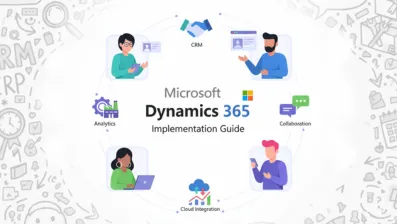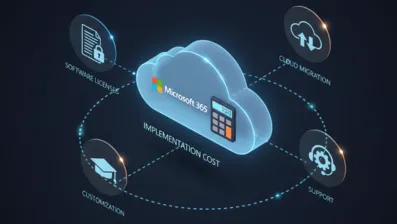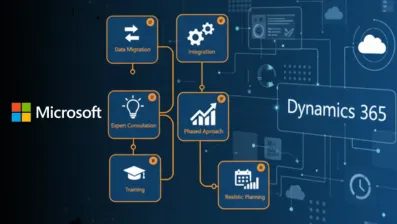Microsoft Dynamics 365 vs Salesforce is one of the most common comparisons businesses face when planning their customer relationship management strategy. Both platforms offer advanced tools to manage sales, marketing, and customer support, but their approach and ecosystems differ in many ways.
For modern businesses, understanding these differences is important before making an investment that impacts daily operations and the organization’s scalability.
In this blog, we will focus on the key differences that exist between Dynamics 365 vs Salesforce in a basic and structured way that will help you decide which platform aligns better with your business goals.
From features to benefits, pricing, and practical insights, this blog will provide you with a detailed understanding of “What is the difference between Salesforce vs Dynamics 365” and their use case for your business.
Microsoft Dynamics 365 Overview
Microsoft Dynamics 365 is a cloud platform that helps businesses manage different parts of their work in one place. It brings together tools for sales, marketing, finance, customer service, and supply chain so teams do not have to use separate systems for each task.
The operations of Microsoft Dynamics 365 reflect that it is both a CRM and an ERP, which means it helps businesses build better customer relationships while managing their daily operations smoothly.
The platform runs on Microsoft Azure, which makes it secure, fast, and reliable. Also, coming from Microsoft, it connects easily with other Microsoft tools such as Microsoft 365, Teams, Power BI, and LinkedIn.
Such an integration further allows the employees to keep working with the existing Microsoft tools, but with an enhanced and upgraded version and advanced business features.
Another key aspect to be aware of Microsoft Dynamics 365 is that it is built in parts called modules. Each module, such as Sales or Finance, can work alone or connect with others. This allows businesses to start small and scale at their own pace without making major changes or complete system upgrades.
Dynamics 365 also makes it easier to use data for better decision-making. It collects information from different teams and shows it in a single unified dashboard. Managers can easily oversee what is working, where issues exist, and what needs to be improved.
In simple words, it can be stated that Microsoft Dynamics 365 implementation helps companies stay connected, organized, and informed so they can serve customers better and scale with minimal effort.
► Benefits of Dynamics 365 For Modern Businesses
The overview of Microsoft Dynamics 365 reflects that it helps businesses work smarter, connected, and scale effortlessly, ensuring their competitiveness in the transforming market. It has been designed to bring people, data, and operations together in one simple system.
Along with this, the platform offers several other benefits that make it useful for both small and large companies. These benefits include:
1. Works Well With Other Microsoft Products
One of the key benefits of adopting Dynamics 365 for business workflow is that it easily connects with Microsoft tools like Microsoft 365, Teams, Power BI, and LinkedIn.
Hence, employees can check emails, track leads, and review reports without the need to switch between different platforms. Such an integration not only saves time but also helps the teams to stay focused.
2. Scales With Your Business
Dynamics 365 is not a complete product in itself, but is made up of separate apps, called modules. Such modules allow you to start with basic apps that are essential for current operations, such as sales.
Further, depending on requirements, apps for finance or marketing can be added. This flexibility ensures that, as a business, you only pay for what you need and can expand when you are ready or your operational requirements increase.
3. Improves Teamwork and Accessibility
Microsoft Dynamics 365 has been designed to streamline the workflow and contribute to improved productivity. Hence, it allows a single sign-in for teams across devices and screens.
Everyone can access the system from anywhere and on any device. For example, a sales team can view customer details while meeting a client, or a manager can review reports from home. This feature of Dynamics 365 makes communication smoother and reinforces teamwork.
4. Helps Make Better Decisions
Another benefit of Dynamics 365 is the built-in AI and analytics that help users better evaluate the data in real time. The teams can understand customer data from diverse perspectives and improve performance.
Such in-built tools also show real-time data on sales, operations, and customer behavior, helping managers plan better and take action quickly, reducing their negative impact on business operations.
5. Keeps Your Data Safe
The platform is hosted on Microsoft Azure, which follows strong global security and privacy standards. Hence, the data stored on the platform is protected with built-in encryption, access control, and regular backups.
Also, it monitors the system for unusual activity to prevent threats, keeping your business information safe and compliant with international rules.
6. Serves Diverse Industries
Dynamics 365 is made of modules that can be adjusted or customized for different types of businesses, ranging from healthcare to retail, manufacturing, and more. It provides each company across sectors the freedom to set up the system according to its workflow.
The recent Microsoft Dynamics 365 trends focus on integration of AI, automation, and low-code development through the Power Platform. These updates make it easier for teams to create custom apps and simplify everyday tasks.
► Pros of Dynamics 365
Microsoft Dynamics 365 has many strong points that make it a smart choice for businesses. It is flexible, reliable, and built to fit different business needs. Along with these, there are some of the main pros that make this platform stand out.
1. All-In-One Business Solution
Dynamics 365 combines tools for customer management, finance, and operations in one place. This helps teams handle daily work without using several different systems.
2. Easy Connection With Microsoft Tools
The platform works smoothly with Microsoft 365, Teams, Power BI, and Azure. This connection makes sharing data and tracking results simple. It also helps keep everyone on the same page since all information stays in one system.
3. Flexible Setup Options
You can use Dynamics 365 in the cloud, on your company servers, or both. This is helpful for businesses that want more control over their data and how it is stored.
4. Easy Customization
With the Power Platform, users can build apps or adjust workflows without deep technical skills. This means companies can shape the system to match how their teams work every day.
5. Built-In AI and Automation
Dynamics 365 uses AI tools like Microsoft Copilot to automate tasks and give suggestions based on data. This helps teams work faster and make better choices.
6. Expands With Your Business
As your business grows, you can add more apps or users without starting over. The pricing model also lets you pay only for what you use, which keeps costs fair and manageable.
► Cons of Microsoft Dynamics 365
Microsoft Dynamics 365 has many benefits and pros that make it a smart choice for businesses. But along with these pros, there are some challenges that businesses should be aware of before implementing it.
Being aware of these D365 challenges will help teams prepare better and plan for support when needed.
1. Complicated Setup Process
Setting up Dynamics 365 can take time, especially for companies that use more than one module. Such a time is required because each part needs to be linked and adjusted correctly. Hence, it is recommended to work with experts to handle this process.
2. Need For User’s Training
New users may find the system confusing at first. The Dynamics 365 dashboard has many features that aim to optimize the business process, but it takes some time to understand where everything is and how to use the features to get the desired output.
Hence, extra training or user guides are often needed to help teams get comfortable.
3. Cost of Advanced Features
The base version of Dynamics 365 covers most needs of an organization, but adding more apps or custom tools can increase costs. Hence, when the businesses look to expand their Dynamics 365 setup or add new features, they may need a bigger budget for licensing and maintenance.
4. Fewer Ready-To-Install Apps
Dynamics 365 offers every required feature built in, and further, depending on requirements, custom features can be added. But such is a key drawback of the system, as it has a smaller marketplace for ready-made apps and add-ons.
Hence, when there is a need for a custom add-on, the development process takes time. However, you can reach out to a reputed mobile application development company for such custom app development within your set budget.
5. Performance Depends on Setup
The speed and stability of the system depend on how it is installed and maintained. Poor setup or limited network support can slow down performance and impact user experience.
► Pricing of Microsoft Dynamics 365
The cost of Microsoft Dynamics 365 depends on which applications a business chooses and how many users will need access. Each app has its own price, and Microsoft uses a monthly subscription model. This lets companies pick only the tools they need instead of paying for a full bundle.
As of 2025:
Sales Professional plan costs US $65 per user each month.
Sales Enterprise plan is US $105 per user each month.
Customer Service Professional plan starts at US $50 per user each month.
Customer Service Enterprise plan is US $105 per user each month.
Above all these plans, the Advanced business modules like Finance or Supply Chain Management start at around US $210 per user each month.
Apart from the monthly subscription cost of licenses, companies also spend on setup, training, and custom features. The Microsoft Dynamics 365 implementation cost can change based on the project size, deployment type, and region.
Salesforce Overview
Salesforce vs Microsoft has always been in debate when it comes to adopting tools for business operations. We have discussed Microsoft Dynamics 365; let’s understand the potential applications of Salesforce.
Salesforce is a cloud-based customer relationship management (CRM) platform that helps businesses manage their sales, marketing, and customer service in one place. It allows teams to store customer data, track sales activity, and manage communication from anywhere using a web browser or mobile app.
The platform is widely used by companies globally and of all sizes. Small businesses commonly use it to manage leads and automate simple tasks, while large enterprises rely on it to handle complex workflows and large amounts of customer information.
Hence, to comply with such diverse industry demands, Salesforce offers different editions so that every company can choose the plan that matches its needs and budget.
A key reason why businesses use Salesforce is that it brings customer data together in one system. It collects information from emails, calls, chats, and social media so that sales and support teams always have comprehensive information about each customer. This makes it easier to offer quick and personalized service.
Another key part of Salesforce is its large app marketplace, called App Exchange. It includes thousands of apps that can add new features or connect Salesforce with other tools. Businesses can also build their own custom apps using the Salesforce Platform.
Being fully cloud-based, Salesforce does not require local servers or a complex setup. It is easy to start and simple to access, which helps teams work from anywhere without worrying about their technical limits.
► Benefits of Salesforce For Modern Businesses
As per the current market scenario, Salesforce is one of the leading and most commonly preferred tools for managing customer relationships and business operations.
When it comes to Microsoft Dynamics 365 vs Salesforce, both offer strong features, and each one has its own standout points. Hence, if you are confused between the two, then let's focus on the key benefits of Salesforce for your business.
1. Puts Customer Data Together
Salesforce helps businesses bring all customer information into one place. Teams can view past conversations, purchase history, and preferences from a single screen. This makes it easier to understand customer needs and respond quickly.
2. Simple to Use and Customize
Salesforce has a clean and easy layout, allowing users to set up dashboards, reports, and workflows using simple drag-and-drop tools. It does not require complex coding, which helps teams adjust the system based on how they work.
3. Works Completely On The Cloud
Salesforce is a cloud-based platform, so there is no need to install software or manage servers. Users can log in from any device and work from anywhere. Also, the Salesforce mobile app allows sales and support teams to stay updated while traveling or working remotely.
4. Uses AI to Improve Productivity
With Einstein AI, Salesforce can predict customer trends, suggest the next best action, and help teams prioritize important leads. This improves accuracy and saves time on routine work.
5. Offers Thousands of Ready-To-Use Apps
Salesforce’s AppExchange provides access to many apps that can extend the system’s features. Businesses can install apps for accounting, marketing, HR, and more, or build their own using the Salesforce platform.
6. Regular Updates and Large Support Network
Salesforce offers frequent updates that bring new tools and better performance. Its large online community, learning portal, and help center further make it easy for users to find solutions to any concerns and stay informed.
► Pros of Salesforce For Businesses
Salesforce is trusted by many businesses due to many reasons, from being simple and helping manage customer relationships. Along with these, other pros make Salesforce a smart decision. These pros can help you understand the difference between D365 vs Salesforce.
1. Covers All Business Needs
Salesforce offers tools for every business function, from sales, marketing, and customer service to data analytics and reporting. Having everything in one place helps teams work together without switching between different platforms.
2. Uses Cloud Infrastructure
The platform is fully cloud-based, which means no software installation or server setup is required, either for a smaller or even for an enterprise-level application. Users can log in from any device, do their tasks, and even get the latest updates automatically. This makes it easy for teams to work from anywhere.
3. Connects With Other Tools
Salesforce can connect with other productivity tools businesses use in their normal course of action, such as Gmail, Outlook, Slack, and many third-party apps. This makes it easier to share data and keep all work systems linked together.
4. Offers Ready-To-Use Apps
Through AppExchange, Salesforce provides access to thousands of apps that add more features. Businesses can find apps for accounting, HR, or marketing and install them easily without coding.
5. Built-in AI and Automation
Salesforce’s Einstein AI can automate tasks, give suggestions, and help teams make better decisions using real-time data. This puts this platform ahead in the Salesforce vs Microsoft Dynamics 365 discussion.
6. Active support and learning platform
Salesforce provides online learning through Trailhead, along with guides and community forums. Users can learn new features and solve problems quickly.
► Cons of Salesforce for Businesses
While Salesforce is a strong and trusted platform, it also has some challenges that businesses should be aware of before using it.
Such cons can also help businesses decide which platform to choose when it comes to D365 vs Salesforce.
1. Expensive for Small Businesses or Startups
Salesforce can become costly over time. The starting plans may fit smaller teams, but adding more users, apps, or custom tools can increase expenses quickly.
2. Complicated Setup and Configuration
Salesforce includes many tools, settings, and modules. Setting up everything correctly often takes time and technical help. Many companies hire certified Salesforce experts for setup and support.
3. Steep Learning Curve
For new users, Salesforce can feel complicated. The dashboard has many options and menus, and it takes practice to learn how everything works. Teams usually need training to use it effectively.
4. Customization Adds Extra Cost
Businesses that need specific features often have to build custom workflows or reports. These changes require developers or consultants, which can raise both setup and maintenance costs.
5. Limited Storage Space
Salesforce gives a fixed amount of data storage with each plan. Companies that manage large data sets often need to buy more storage, which adds to the total cost.
6. Always Depend On The Internet
Salesforce runs completely on the cloud. A slow or unstable connection can affect performance and limit access to important data.
► Pricing of Salesforce Implementation
Pricing is another important factor that justifies the difference between Salesforce vs Microsoft Dynamics 365.
The cost of Salesforce depends on the plan and the number of users in a business. Salesforce follows a monthly subscription model, and the price can vary based on features, support, and level of customization.
As of 2025:
Salesforce Starter Suite plan begins at around US $25 per user each month, which includes basic sales, service, and marketing tools.
Professional plan starts at about US $100 per user each month.
Enterprise plan costs about US $175 per user each month.
For large organizations that need advanced tools, the Unlimited plan starts at around US $350 per user each month.
Salesforce also announced a price increase of about 6% in 2025. In addition to subscriptions, businesses should plan for costs related to setup, user training, and app integrations. These extra expenses often depend on how much customization the company needs.
Key Difference Between Microsoft Dynamics 365 vs Salesforce
When it comes to D365 vs Salesforce, both help businesses manage sales, marketing, and customer support from one place. They share a similar purpose but differ in setup, features, and how they connect with other tools.
Knowing the key difference between Dynamics 365 vs Salesforce helps companies choose a platform that fits their goals and work style.
The table below highlights the main differences between the two platforms.
Feature | Microsoft Dynamics 365 | Salesforce |
Platform Type | Combines CRM and ERP in a single system for complete business management. | Focuses mainly on CRM for managing sales, marketing, and service. |
Deployment Options | Available on the cloud, on-premise, or both, based on business preference. | Fully cloud-based and accessed through the web or mobile app. |
Integration | Works closely with Microsoft 365, Power BI, Teams, and Azure. | Connects easily with Gmail, Slack, and many apps through AppExchange. |
Customization | Uses Power Platform for low-code customization and automation. | Uses Lightning Platform and Apex for custom workflows and apps. |
AI Features | Offers Copilot AI for real-time insights and automation. | Includes Einstein AI for lead scoring, forecasting, and recommendations. |
User Experience | Feels familiar to Microsoft users and fits well with existing tools. | Has a modern interface that is simple to use for new users. |
Industry Options | Covers areas like sales, finance, supply chain, and HR. | Focuses mainly on CRM but supports marketing and analytics add-ons. |
App Marketplace | Has a smaller marketplace with limited third-party apps. | Offers a large AppExchange with thousands of ready-to-use apps. |
Pricing | Starts around US $50 to $65 per user each month, depending on modules. | Starts around US $25 per user each month for the basic plan. |
When comparing Microsoft Dynamics 365 vs Salesforce, the key difference between the platforms lies in their flexibility and integration options.
Dynamics 365 is better for companies that already use Microsoft tools and need both CRM and ERP in one place. Salesforce is ideal for businesses that want an easy-to-use, cloud-based CRM with a wide range of apps and automation tools.
Which One to Choose?
Deciding between Microsoft Dynamics 365 vs Salesforce depends on how your business works and what you expect from your CRM system. Both platforms help manage sales, marketing, and customer service, but they are built for slightly different needs.
Microsoft Dynamics 365 fits well for companies that already use other Microsoft tools such as Microsoft 365, Teams, or Power BI. It connects easily with these platforms, making it simple to move data and track performance in one place.
Because it includes both CRM and ERP, it helps manage not only customers but also finance, inventory, and operations. Businesses that want more control over their data or prefer to host the system locally often find Dynamics 365 more suitable.
Salesforce is a better choice for businesses that want a fully cloud-based solution with less setup work. It has a clean and simple layout, which makes it easy for new users to learn.
The AppExchange store has thousands of apps that can add new features without needing custom development. This makes Salesforce useful for companies that want flexibility and access to many ready-made tools.
In a Dynamics 365 vs Salesforce comparison, Dynamics offers stronger integration and more control, while Salesforce provides faster setup and a wider choice of third-party apps. To find the difference between Salesforce vs Dynamics 365, look at what matters most to your business.
If you want deeper Microsoft integration and advanced control, Dynamics 365 is the better fit. If you prefer simplicity, cloud access, and quick adoption, Salesforce can be more convenient.
How Can DotStark Help You Decide the Best?
Picking the right CRM system can be confusing when both Microsoft Dynamics 365 and Salesforce have strong features. DotStark helps businesses make this choice with proper guidance and step-by-step support. We work with you to understand your goals, budget, and daily operations before suggesting the best option.
We provide complete Microsoft Dynamics 365 consulting services, including setup, data transfer, user training, and ongoing support. Our goal is to make the system fit your business perfectly so your team can start using it without confusion. We also explain the associated costs and upgrade aspects clearly so that you can plan your budget and avoid hidden expenses.
If your company already uses Salesforce or plans to move from another CRM, we can help you set it up, customize it, and connect it with other tools you use every day.
As a trusted partner, we also build mobile apps that work smoothly with your CRM system. These apps help your team manage leads, check sales data, and track customer details from anywhere. With the right tools and support, your business can work faster, stay organized, and grow confidently.
Conclusion
Both Microsoft Dynamics 365 vs Salesforce help businesses manage customers, improve teamwork, and grow faster. They share the same goal but work in slightly different ways. The best choice depends on how your business operates and what kind of system you are most comfortable using.
Microsoft Dynamics 365 is a good option for companies that already use other Microsoft products like Microsoft 365, Teams, or Power BI. It connects easily with these tools and brings all business data together. Since it combines CRM and ERP, it helps manage both customer relationships and internal operations in one place.
Salesforce suits businesses that want a simple cloud system that works right out of the box. It is easy to access from anywhere and offers a large number of ready-to-use apps. Its AI tools also make it easier to understand customers and plan sales.
If you aim to find the difference between Salesforce vs Dynamics 365, it can be concluded that both platforms support business growth. The main difference between Salesforce vs Dynamics 365 comes down to setup style, pricing, and integration needs. The right one is the platform that fits your goals and helps your team work more efficiently every day.
Frequently Asked Questions
The main difference between Salesforce vs Dynamics 365 is how they work and what they include. Salesforce is a cloud-based CRM focused on sales and customer service, while Microsoft Dynamics 365 combines CRM and ERP features, letting businesses manage both customers and internal operations in one platform.
For small businesses, Salesforce is easier to set up because it runs fully on the cloud and needs less technical work. Microsoft Dynamics 365 is better for companies that already use Microsoft tools and want a system that can grow as the business expands.
The pricing is a key factor that helps businesses decide between D365 vs Salesforce. Salesforce plans start around US $25 per user each month, while Microsoft Dynamics 365 starts around US $50 per user each month. However, in the long run, Dynamics 365 is much affordable and scalable for businesses compared to Salesforce.
Yes. Many businesses use both platforms for different tasks. They can be linked using built-in connectors or APIs, allowing data like leads and customer information to move between systems. This helps teams get a complete view of customers and avoid duplicate work across platforms.
Both platforms include built-in AI features. Microsoft Dynamics 365 uses Copilot AI to assist with reports and automation, while Salesforce uses Einstein AI to predict sales trends and recommend actions. Both tools make daily tasks faster and improve decision-making through real-time insights.

.webp)



.webp)

.webp)
.webp)

.webp)

.webp)

-(1).webp)

.webp)


 +91 9680599916
+91 9680599916
 vanshika@dotstark.com
vanshika@dotstark.com
